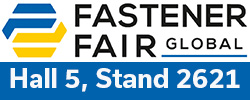

Here we invited our media partner Fastener World Magazine to give an insight into the Taiwanese fastener market and some of the challenges that Taiwanese manufacturers are facing in an increasingly global and competitive market.
Back in February 2022 when the EU imposed anti-dumping duties on certain iron or steel fasteners from China, Taiwan’s fastener exports experienced an unprecedented boom, reaching over 1.6 million tonnes annually. However, since the end of Covid-19, and especially in recent years – due to stagnant orders from overseas customers, rising manufacturing costs, and unstable geopolitical conditions – Taiwan’s fastener exports have been unable to achieve the highs of pre Covid-19.
With increasing competition from China and emerging markets; the potential impacts from the upcoming CBAM regulation; a stronger focus on developing IT industries in Taiwan; plus pressure from customers for Chinese or Taiwanese suppliers to establish overseas factories; there are a number of significant challenges for many Taiwanese fastener manufacturers. Given these market changes, maintaining a robust global fastener supply chain has become a priority for all stakeholders in Taiwan’s fastener industry.
In a recent interview, Arthur Chiang, president of the Taiwan Fastener Trading Association (TFTA), reported that the Taiwanese fastener industry experienced a production and sales decline of approximately 10% to 30% in 2024. This downturn was attributed to factors such as the Russia-Ukraine war, fluctuations in exchange rates, inflation and rising electricity, as well as oil prices, which have disrupted market recovery. Arthur emphasised that the primary challenges for Taiwanese fastener manufacturers are manufacturing costs and remaining competitive within the market.
He pointed out that while customers may consider switching to lower priced competitors, Taiwanese companies offer superior quality and advanced technology – along with a more stable financial foundation. Therefore, diversifying orders to include Taiwanese companies is a wise choice for sustainable operations and risk management.
Signs of recovery on the horizon
While opinions on economic performance vary, and different fastener categories have experienced distinct supply and demand dynamics, making a comprehensive judgement is challenging. Based on export data from the first nine months of 2024, Taiwan exported approximately 936,000 tonnes of fasteners – slightly up from 934,000 tonnes during the same period in 2023. This increase coincided with low priced wire rods being dumped by China and other countries, potentially signalling that the economy has bottomed out and is poised for recovery. Following this trend, the export forecast for 2024 suggest exports would reach around 1.2 million tonnes by the end of the year, which means there is no need for excessive pessimism. If tensions from the Russia-Ukraine war ease next year, and major central banks implement interest rate cuts and quantitative easing policies to stimulate growth, a new wave of global economic recovery may be on the horizon.
The sluggish European economy can be partly attributed to hasty ‘net zero’ carbon policies. European car manufacturers were compelled to develop electric vehicles but did not anticipate that competitive Chinese electric cars would capture significant market share before their own technology had matured. Furthermore, Germany, Europe’s largest automobile manufacturer, is facing higher energy costs due to the Russia-Ukraine conflict, resulting in decreased demand for fasteners due to sluggish industrial production. Germany is also a crucial partner for Taiwan’s fastener exports, indirectly impacting Taiwanese companies’ orders. Economic cycles fluctuate naturally; thus, it is estimated that current demand stagnation is likely a short term phenomenon.
Potential impacts of CBAM on fastener prices
As 1st January 2026 approaches, the date when the EU CBAM regulation will formally impose carbon taxes, manufacturers worldwide are beginning to feel pressure from European importers. Fortunately, Taiwanese fastener manufacturers still hold an advantage over other Asian competitors regarding carbon reduction efforts. The president of EFDA noted in a recent interview that Taiwanese manufacturers are ahead in preparing for CBAM requirements, which serves as an important bargaining chip for expanding sales in Europe.
However, there are concerns within the industry that achieving the EU’s ‘net zero’ carbon reduction target may increase manufacturing costs by an additional 20% to 30%, further raising fastener prices. Whether this will be beneficial or detrimental for end users remains uncertain. Questions also arise about whether the implementation schedule might be delayed or if carbon taxes could be adjusted based on product types or import quantities.
Competing amidst increasing challenges
In Taiwan challenges include labour shortages and high operating costs, due to limited land availability and difficulties obtaining competitively priced materials domestically. Additionally, Taiwan does not benefit from preferential or zero tariffs like ASEAN countries. As a result of these disadvantages, some manufacturers are opting to invest overseas. Whilst large factories, with strong capital, may manage this transition well – by serving local markets alongside exports – the small and medium-sized enterprises face greater challenges.
In addition, although Taiwan’s fastener industry initially outpaced those in China and south-east Asia in development speed, rapid advancements in these regions mean Taiwanese businesses can no longer afford complacency. They now face significant competition both as rivals and potential collaborators in the global market. Over the past three decades, many Taiwanese companies have established factories in Vietnam and other south-east Asian countries where they have thrived. Now even Chinese firms are investing in south-east Asia, seeking new opportunities. This means competition will only intensify.


Will joined Fastener + Fixing Magazine in 2007 and over the last 15 years has experienced every facet of the fastener sector - interviewing key figures within the industry and visiting leading companies and exhibitions around the globe.
Will manages the content strategy across all platforms and is the guardian for the high editorial standards that the Magazine is renowned.
Don't have an account? Sign Up
Signing up to Fastener + Fixing Magazine enables you to manage your account details.